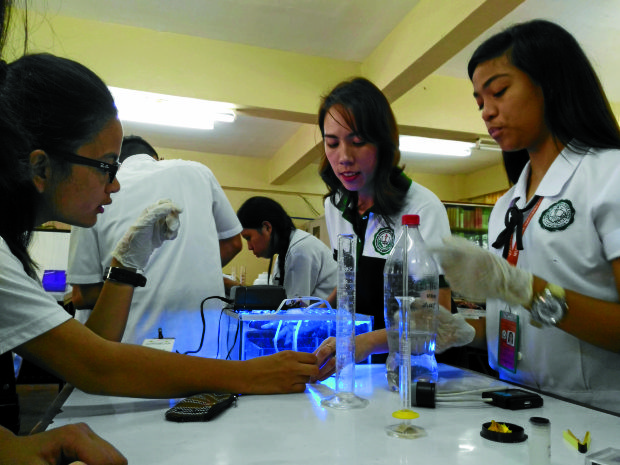
Olarte (center) starts her Research class, transforming the classroom into a professional laboratory. —CONTRIBUTED PHOTO
She is an advocate of invention-driven instruction—one that encourages creative thinking and problem-solving skills among her students.
Ma. Regaele Olarte, Research and Physics teacher at Muntinlupa National High School, a public school 100 meters away from the national penitentiary, prides herself in having students that are
all scientist-inventors in the making.
The science teacher is a budding inventor herself who has devised a rechargeable silver spoon that keeps beverages warm until the last sip—and sterilized, too.
Olarte explained that silver is an oligodynamic metal, whose metal ions kill and inhibit the growth of fungi, bacteria and other microbes.
She said her invention was inspired by stories of old about people putting silver coins in their drinks and food to keep them from spoiling.
Top it, with a twist
Olarte wants her students to top that with a twist, never mind if the laboratory lacks the needed apparatus.
The teacher said lack of equipment, which is a common problem among public schools, should not stop the students from exploring their potential. The success of the students, she said, lies in the creativity and dedication of the teacher.
“It is very fulfilling when you see your students work independently as scientists, even to the point that I become merely their shadow. It just shows that they know what they’re doing and they are applying the concepts they have learned,” she said.
Metrobank recognition
For her creative dedication, Olarte was recently recognized by Metrobank Foundation as one of the Ten Outstanding Teachers of 2016. The awardees—four elementary school teachers, four high school teachers and two college professors—each received a medallion, a trophy and a cash prize of P500,000.
Olarte has coauthored K-12 modules for teachers and students in Grades 9 and 10 nationwide. She has also written national achievement tests in Physics.
One of her projects in progress is the use of the indigenous ashitaba healing herb not only to prolong the shelf life of food but also to contain malnutrition, with its high vitamin and mineral content.
Olarte said she is planning to cultivate ashitaba plants on their school grounds which could be used in feeding programs at their school and in the community.
“Aside from teaching scientific concepts, I make sure that I am becoming a role model to my students. I make sure that the science concepts they use in class are also applied in their everyday lives, on how they could be productive members of the community,” she said.
Olarte, who had previously taught in a private school, admitted experiencing “culture shock” in her first years in a public school—with her full teaching load, jam-packed classrooms and students who come to school without baon (packed lunch).
‘Brightest of the bright’
But even with the setbacks, she said it was in the public schools that she has seen the “brightest of the bright.”
“Despite the bigger opportunities of working abroad, I will not exchange that for the honor to serve our Filipino students. I already made a commitment, and that is to offer myself to the country,” Olarte said.
Olarte admits that she takes “homework” home with her and it cuts quality time with her husband and two children.
“Sometimes I go home when my children are already asleep. I pity my children who sometimes fall asleep while waiting for me to finish my work,” she said.
She said she was lucky, however, to have a very understanding family that believes that her teaching should always be par excellence.
All about love
Her husband, a former seaman in the Philippine Navy, stays at home to attend to their family business and watch
over their children ages 3 and 5. Her parents also help in raising her kids.
It is a tough job juggling priorities but Olarte said she never gets tired of doing what she loves. “I enjoy teaching. Being surrounded by young souls willing to learn makes me feel young, too,” she said.
“Anybody can become an outstanding teacher. She should serve not only her students but also the community where she belongs. She should just do what she started in the beginning: love her students. Nothing goes wrong with love,” she said.